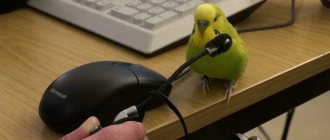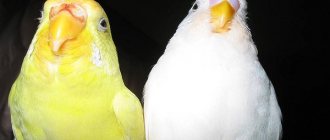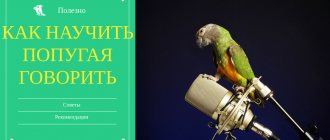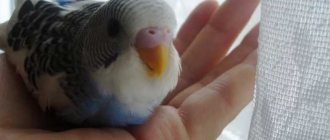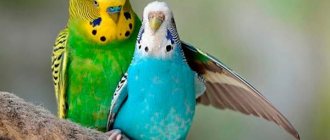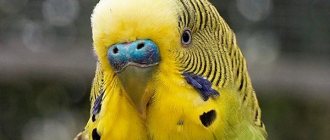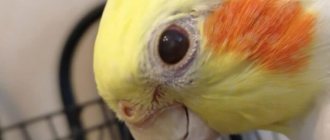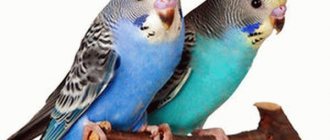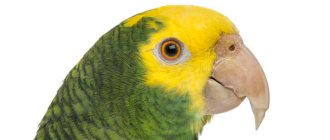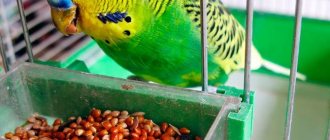- home
- Parrot
- FAQ
05/16/2019 The high demand and popularity of budgies as pets is due not only to their attractive appearance, cheerful disposition and unpretentiousness, but also to the ability to teach budgies to talk. The bird itself will not speak. But if the owner pays due attention to the training and patiently works with the feathered pet day after day, the training will bring results.
Can a bird start talking at home?
Budgerigars are not the only birds in the world that can speak using human sounds and putting them into words.
At the same time, many other species of parrots can do this better and much more consciously.
However, budgerigars are the most common and suitable for home keeping, so many of their owners are concerned about the possibility of teaching the bird to talk.
If we approach this issue with all rigor, then the sounds of budgies cannot be called a conversation. This is just an imitation of what was previously heard. With the same success, parrots can imitate other sounds they like.
To teach a budgie, it is not enough that it simply hears everyday human speech, although some birds are capable of this. To achieve the result desired by the owner, the parrot needs to be dealt with purposefully.
It should be noted that feathered pets can have both different personalities and different learning abilities. Thus, if a bird is not inclined to talk, then it is almost impossible to teach it.
It is almost impossible to determine at the time of purchase whether the pet will be talkative or not. These will become clear only from the results of classes with her. At the same time, it should be noted that the gender and age of the pet indirectly influence learning abilities, which will be discussed later.
It is also useful to read: Is it necessary to cover a parrot’s cage at night?
How to teach a budgie to pronounce sounds clearly?
Parrots, just like people, have different abilities and talents. One bird may have more ability to produce sounds, while another may have less. Perhaps your winged friend gives all his strength, gives his all in every lesson. If it seems to you that he is not trying, then first you should think about your pronunciation . Perhaps it needs to be adjusted. Maybe the parrot just needs more practice and extra lessons . If you provide them, then the pet will begin to pronounce words perfectly when enough time has passed.
When to start learning
Wanting to teach their pet to talk, many owners make the extremely serious mistake of starting to actively engage in this immediately after purchasing the bird . This is the wrong tactic.
The fact is that arriving and staying in a new home poses significant stress for a pet. Parrots need some time to adapt and get used to new living conditions. Naturally, conducting a lesson during this period is fruitless.
Is your parrot tame?
Not really
On average, the adaptation time for birds is about two weeks. However, in practice, all birds are different in their temperament and adaptive abilities. Therefore, for some, the adaptation period may end in a few days, while for others it lasts more than one month.
As for the optimal age when a bird can learn to talk, it should be understood that the younger the pet, the better learning abilities it has.
Young budgerigars aged 1 to 4 months learn best.
How to achieve longevity for your pet?
Having become the owner of a parrot, many are interested in how to teach it to speak and tame it. At the same time, from the very beginning it is worth thinking about how to ensure the longest possible life for your pet. The most important factor that affects life expectancy is proper nutrition. We recommend that you read the material “Feeding Parrots: 5 Basics of a Proper Diet,” which covers all the necessary components: greens, branch food, sprouted grains, berries, fruits, vegetables, cereals, and of course dry grain mixture. After all, it is the right combination of these elements that will help achieve the health and longevity of your winged friend.
Does a parrot's gender affect its ability to learn to speak?
There is a fairly common belief that females are less likely to learn to speak compared to males. In this case, their lower cognitive abilities are cited as the main argument.
Of course, this is not true and females are no less capable and intelligent than males. However, female parrots actually imitate the sounds of human speech much less often.
This has a well-founded biological basis. Thus, boys are more expressive and receptive to new things, since their task is to attract females during mating games. The female is more focused on caring for her offspring.
However, persistent training with a girl parrot can also bear fruit. At the same time, in this case it is necessary to work with a pet from as early an age as possible. It has been noted that adult females, especially those who have previously bred chicks, are not inclined to imitate the sounds of human speech.
In this regard, if the owner wants to purchase a girl parrot, then she should not be older than 4 months in order to be able to teach the pet to talk.
Can an adult bird begin to pronounce words?
The lifespan of a budgerigar is about 10-12 years in captivity. Naturally, a bird can live that long if it is properly maintained. It should be noted that, according to ornithologists, birds can live approximately the same amount of time in the wild.
Budgerigars mature quite early. At one year of age, puberty begins, when the female can lay eggs. At the same time, laying eggs is possible only if there is a place for nesting, so breeding budgerigars in captivity, as a rule, does not present significant difficulties.
At the same time, young parrots actively learn new things and have good learning abilities for up to 6 months. Of course, this does not mean that older pets are not able to imitate the sounds of human speech. However, it should be understood that training adult birds may require a significantly greater commitment on the part of the owner, both in terms of time and effort expended.
Adult females with already hatched chicks are least amenable to learning to speak.
In general, it is much more difficult to teach an adult bird to speak, and therefore young birds are recommended for purchase.
Symptoms
Loss of speech ability may be due to a developing disease. In this case, various accompanying symptoms are noted:
- frizz;
- feathers take on a wet and unkempt appearance;
- lack of washing procedures;
- no chirping;
- eats poorly, refuses to drink;
- there is a change in the color and consistency of the droppings;
- falls from the perch;
- the eyes take on a reddish, swollen appearance.
Among the diseases that prevent a bird from speaking are colds, viruses, infections, and the presence of parasites in the trachea, inside the body. Tracheal mite is the most common pathology that prevents a pet from not only speaking, but also eating. If a drooping, painful condition occurs, you must immediately contact a veterinary clinic.
Valuable tips - how to quickly train a wavy
Following the recommendations below will teach your bird to imitate a human voice.
Regularity. With any training and training, the regularity of the classes is important for achieving success. Thus, it is allowed to work with the bird every day or at least every other day if the owner is very busy. At the same time, you should not overload the bird with activities. No more than 20 minutes a day is enough. Otherwise, their effectiveness is noticeably reduced.- Proper organization of classes. During training, the bird should be completely calm, without being distracted by extraneous noises or other irritants. To do this, it is desirable that the room be as quiet as possible. The sound of a TV or radio will distract your pet, so it is best to turn them off for a while.
- Low pitch of voice . Budgerigars are more susceptible to high sound frequencies. That is why women are better at teaching a pet to talk. In addition, children also have a high timbre, so if a child shows interest in a bird, then you can entrust the activities to him. Such interaction, in addition to a good result, will also benefit the child, bringing him a lot of joy from communicating with the pet and the result obtained.
- Clear diction. Budgerigars imitate the sound they hear. That is why it is important that the owner’s diction is at a good level, as well as the pronunciation of individual sounds. If the owner speaks inarticulately, omitting certain sounds, then the bird will remember this and will reproduce exactly this variation of sound.
- Reward with a treat . Parrots do not understand and do not attach any meaning to the sounds they imitate. However, they can achieve colossal results and even speak in entire phrases and sentences. In this case, associative connections are of great importance, that is, the pet perceives the spoken sound in connection with a certain event.
Thus, good results can be achieved by rewarding each success of the bird with a treat. For a correctly pronounced sound or word, you should reward the parrot with fruit or something that he likes.
In addition, many parrot owners are interested in the question of how to train their pets in pairs. It should be noted that having a pair, the parrot may pay less attention to the owner, which will negatively affect learning. However, a parrot that is already talking can teach another bird to imitate sounds.
Thus, if there is a task to teach two young birds to talk, then this must be done separately. If one parrot can already talk, then pairing another bird with it will only contribute to its speedy learning.
It is also useful to read: Caring for a budgie at home
Important information regarding training
When purchasing a parrot, those who want to teach their pet to speak should choose birds that are calm, curious, and interested in everything around them. Such birds easily become interested in human speech, and this is the first step to successful learning. In addition, the bird, of course, must be vigorous and healthy.
Before starting the lesson, it is worth taking out the toys and mirror from the cage. Otherwise, the bird will be constantly distracted from its activities by entertainment. But, of course, after training, the bird’s playing accessories must be returned to the cage. It is worth noting that a mirror can interfere with a bird’s learning, since it perceives the reflection as a fellow bird, and, accordingly, will strive to communicate with it in its native language.
When conducting lessons in a room with a bird, there should be no distractions - other people, animals, the TV on, etc. There should only be two people in the room - a teacher and a student, i.e. owner and parrot. The environment should be as calm as possible.
You need to speak not quickly, not loudly and not sharply, but at the same time emotionally. Inexpressive speech will not attract the bird’s attention, and too harsh intonations will frighten the bird. You also cannot move quickly, gesticulate, etc. – in such an environment the bird will be scared and uncomfortable. Goodwill should be felt in the voice. When learning one word, you cannot change the tone of pronunciation from lesson to lesson, as this can confuse the bird.
FAQ
Next, we should look at the most frequently asked questions among owners of budgies related to the possibilities of teaching their pets to imitate the sounds of human speech.
Will the bird talk if you turn on voice recording?
Quite often on the Internet, among recommendations on how to teach a parrot to speak, you can find advice on using a voice in a recording. This may not necessarily be the voice of the owner himself. Today, there are special applications with already developed repetitions of certain words and expressions that feathered pets can learn to the greatest extent.
Undoubtedly, training with the help of voice recording is much better than irregular training or no training at all. However, you should not get too carried away with this method. If you turn on the recording too often, your pet will develop a routine attitude towards it, and he simply will not pay any attention to it.
In addition, live, direct communication with the owner regarding the result and the organization of the process itself is much better perceived by the bird.
What words does the wavy remember better?
The anatomy of parrots is, for obvious reasons, significantly different from that of humans. Therefore, the reproduction of sounds by a bird is carried out by completely different mechanisms. In this regard, parrots perceive words with a large number of hissing words well, as well as with the sound “r”.
The words themselves should be small, short, mostly two-syllable. After your pet learns to pronounce simple words, you can move on to learning phrases.
How many words can he learn?
The number of words that a parrot can reproduce is large enough to make logical sentences out of them. However, the concept of “logic” cannot be fully applied to the sounds made by a bird.
Sometimes feathered pets use words at random, uttering completely meaningless phrases. This does not mean that the parrot will not pronounce the correct phrases if you study them not at the level of individual words, but their combinations.
On average, a budgerigar's vocabulary can be several dozen words (about 30-40).
Can you forget all the words
Many parrot owners notice that over time their pets reproduce the sounds of the human voice less and less, gradually forgetting all previously learned words. Many see the reason for this in the maturation of the bird. However, it's not a matter of age.
Indeed, budgies may stop talking, but this happens if the owner stops working with his pet . Thus, in order for the parrot to please the owner with its conversation, you need to regularly train this skill.
In the absence of practice, the bird will forget all the words that it had previously learned. At the same time, it should be noted that teaching an adult bird that has lost the corresponding skill to imitate the sounds of a human voice is much more difficult than a young bird that has not previously spoken at all. This is especially true for females who have previously bred offspring.
Interesting Facts
At the beginning of the article it was said that birds can even carry on conversations, but we embellished the reality a little - in fact, parrots reproduce, imitate your speech or some sounds, so in order for your Keshka to learn to say words on the spot and thereby entertain you and your guests will have to work a little extra. In fact, there is nothing difficult about this, you just need to do a little training.
Photo from the site www.popugai2.ru
For example, you want your friend to greet you from work with the word “hello,” so when you open the apartment door, say “hello” very clearly, loudly and clearly, every time, and after that give your baby a treat. After several lessons, the bird will remember that the treat is associated with the word hello and your return home.
